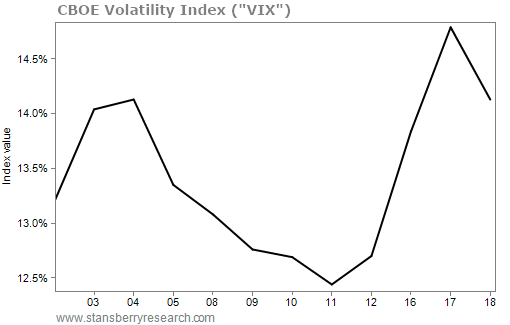2024 is kicking off as a rough year for investors.
We've already seen a big spike in volatility...
The CBOE Volatility Index ("VIX") is a measure of expected volatility. It reflects the price investors are willing to pay for protection on the upcoming returns of the S&P 500 Index. The higher the index, the more investors think the market will move.
Earlier this week, we saw the VIX rise about 18%. Now, we don't consider volatility to be elevated until it hits 20%. It's still only around 14% as I write. But this spike is telling us that investors are clearly getting more worried.
While I'm bullish on stocks in the long term, I wouldn't be surprised to see some corrections in the coming months, given the levels of debt I see everyone (from companies to individuals) holding due to the uncertainty of the upcoming U.S. presidential election.
This is the time to ask yourself, "What should I do during a market correction?"
Don't let your fear pull you into the chaos.
This is one of the hardest rules to follow.
Most of us are hardwired to follow the herd...
A part of the brain called the amygdala drives this response. It consists of two tiny structures deep in the brain that connect emotions and fear. This is the so-called "fight or flight" system.
When individuals don't follow the crowd, their amygdalae start firing. It makes them feel nervous... even sick to their stomach. This was useful in prehistoric days. There was safety in numbers when trying to avoid predators.
But our instincts work against us in the markets. They can cause investors to buy at the top, when everyone else is buying... and sell at the bottom, when everyone else is dumping their stocks.
The way to profit from fear is to avoid the herd... Sell what everyone wants to buy and buy what everyone is selling.
If you want to know what you should be buying today, make sure you tune in next week when Whitney Tilson and Porter Stansberry reveal a new way to see which stocks could double your money.
This breakthrough, which you'd normally need $2 million to access, has been crushing the returns of gold, bitcoin, and the S&P 500 Index...
Click here to reserve your spot.
Now, let's dig into the Q&A... As always, keep sending your comments, questions, and topic suggestions to [email protected]. My team and I really do read every e-mail.
Q: Does this mean you should wear [hearing aids] even when you're home alone enjoying the peace and quiet? – J.W.
A: Great question, J.W. I certainly understand the desire to soak up all the peaceful, quiet moments you can get...
However, hearing experts recommend wearing your hearing aids the entire time you're awake – except when you're around moisture (like while showering or using hair spray, for instance), which can damage them.
This is because your hearing aids are not only affecting your ears... They're helping your ears and brain stay stimulated and work together.
As Catherine Palmer, University of Pittsburgh professor and former president of the American Academy of Audiology, said in a 2020 interview:
We don't want the auditory system deprived of sound because over time that can change auditory processing abilities... The ear is a doorway to the brain, it doesn't make sense to have it partially closed part of the day.
When you're constantly straining to decipher the sounds around you, it makes your brain work harder... but not in a good way. Straining actually stresses your brain out and can lead to other problems, like not remembering conversations, or areas of your brain shrinking because they haven't been used to process sound for long periods of time.
And let's not forget that hearing ability is also closely linked to developing dementia or depression... as well as keeping you safe from potential danger in your environment.
You can still enjoy peace and quiet at home. Just don't take out your hearing aids to do it.
What We're Reading...
- Did you miss it? No other company in this industry compares.
- Something different: How much of the world can we model?
Here's to our health, wealth, and a great retirement,
Dr. David Eifrig and the Health & Wealth Bulletin Research Team
January 19, 2024

